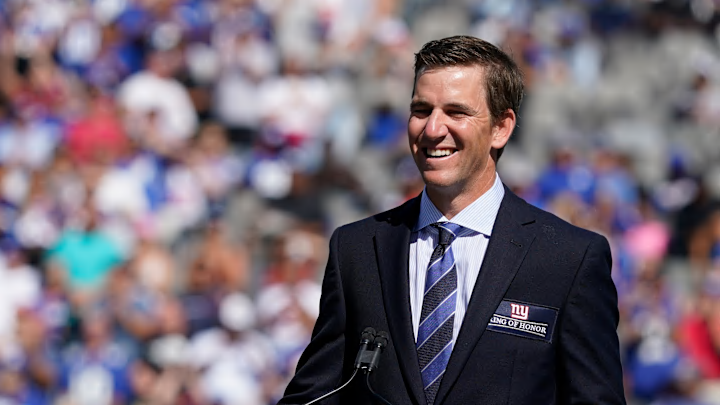Brandon Jacobs Throws Support Behind Giants QB Eli Manning's HOF Candidacy

In this story:
Retired New York Giants quarterback Eli Manning’s legacy in the NFL is one of both debate and undeniable achievement.
But when it comes to the two-time Super Bowl MVP and 16-season signal caller’s Pro Football Hall of Fame candidacy, opinions tend to be split as he presents a compelling case for induction in his first year of eligibility.
According to his former teammate, running back Brandon Jacobs, the decision is easy.
“I think Eli is by far first-ballot Hall of Fame,” Jacobs told TMZ. “And he definitely deserves to get in this year.”
This isn’t simply a case of Jacobs throwing blind loyalty behind his one-time quarterback. Manning’s career stats are impressive and serve as a foundation for his Hall of Fame argument.
Over 16 seasons, Manning compiled 57,023 passing yards, 366 touchdowns, and a passer rating of 84.1. At his retirement, Manning ranked seventh all-time in passing yards, passing touchdowns, and completions.
He also started 234 regular-season games and 210 consecutively, which is impressive, considering the physical toll of playing behind offensive lines that were often less than stellar.
These numbers place Manning among the greatest quarterbacks to ever play the game, including Tom Brady, whom he defeated twice in the Super Bowl.

Yet, Manning’s Hall of Fame case is about more than just statistics. His defining moments came in two Super Bowl victories over the New England Patriots, both times defeating a dynasty led by Brady and Bill Belichick.
The first was in Super Bowl XLII, where Manning led the Giants to a 17-14 victory, ending the Patriots’ pursuit of a perfect season.
The game's defining play—Manning escaping a near-sack to deliver a 32-yard pass to David Tyree, who made the iconic “Helmet Catch”—is forever etched in NFL lore and franchise history. Manning followed that up four years later in Super Bowl XLVI, engineering another clutch performance to defeat the Patriots 21-17.
Critics often argue that Manning’s regular season record of 117-117, along with a career marked by some ball security issues, undermines his Hall of Fame candidacy.
However, such critiques overlook the context of his career. Manning’s teams were rarely dominant. Unlike Brady or his brother Peyton Manning, Eli never had the benefit of playing on a consistently elite roster.
The Giants’ Super Bowl-winning teams were built on strong defenses and an underdog mentality.
In 2011, the Giants' win percentage was 56.3% (9-7), and Manning still managed to lead them to a Super Bowl victory after dominating top teams in the postseason.
Manning may not have been the flashiest quarterback or a regular-season juggernaut, but his legacy is one of clutch performances and indisputable success in the postseason.
With two Super Bowl MVPs and a slew of memorable moments to his name, Manning’s Hall of Fame candidacy deserves serious consideration.
As Jacobs aptly put it, for those who truly understand the game and its history, Eli Manning’s place in Canton is “no question.”
More Giants Coverage
New York Giants On SI Social Media

Abby Dixon brings seven years of expertise in game analysis, player performance, and trades to her coverage. Before freelancing for various outlets, she launched her sports writing career with Emmy award-winning Met Media, a student-run news organization for MSU Denver. Among these, her work with Sportsnaut allowed her to hone her skills and discover a true passion for football writing — a focus she now brings to her coverage for New York Giants On SI.